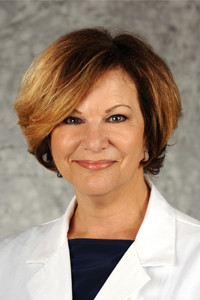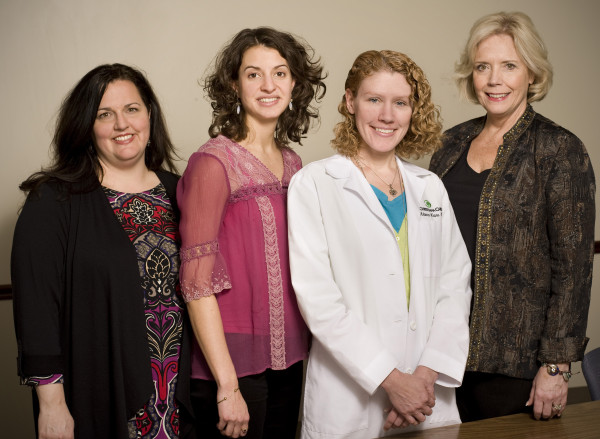Integrative model blends care for the whole patient: body and mind

While behavioral health specialists and primary-care doctors have long practiced on parallel paths — one caring for problems of the mind, the other ailments of the body — Christiana Care’s successful model of integrating therapists within specialty and family medicine practices is opening mental health doors to many children, adolescents and adults who might otherwise never seek help.
About 25 percent of patients seen by primary care doctors have behavioral health issues. Many never ask for mental-health support, either due to stigma or because they simply do not recognize how mind-related issues may cause or worsen many physical symptoms. Those who do follow up on their doctor’s recommendation for a mental-health consult have traditionally faced barriers such as lengthy wait times for appointments or insurance limitations.
Real-time collaboration among the patient, primary-care provider and behavioral health specialist makes the integrative approach successful. It’s been working well within Christiana Care’s cancer program, heart and vascular services, women’s health, and internal medicine and pediatrics, said Penny Vigneau, senior vice president for Cardiovascular and Behavioral Health Services. It also follows an established national and international movement to align behavioral health with primary care in an effort to prevent or reduce the impact of mental health issues.
Here are just a few recent stories of patients at Christiana Care:
- A man facing a series of heart tests for chest pains — fearing the need for medical or surgical intervention for serious heart problems — was encouraged to learn he was, instead, experiencing the very treatable effects of anxiety and depression.
- A young woman, long suffering recurring tension headaches not helped by medication, found long-sought relief through guided meditation, upper-body exercise and tips on setting limits on demands placed by both herself and others. Within weeks, her headaches became a rare occurrence.
- A young man visited the doctor’s office feeling depressed. A meeting with a therapist disclosed domestic violence was driving the symptoms.
- A woman with diabetes wasn’t properly managing her condition because she was having panic attacks over giving herself daily injections. She learned coping and relaxation skills that now make it possible for her to take her insulin on the prescribed schedule.
“The focus is on wellness, prevention and care for the whole person, and resolving issues before they build up to serious problems requiring intensive outpatient mental health treatment or hospital admission for medical complications,” Vigneau said.
Transition significantly expands access to mental health care
To focus resources where they can have the greatest impact in meeting the community’s behavioral health needs, therapists previously assigned to Christiana Care’s adult and adolescent outpatient behavioral health services are transitioning into primary-care practices and health care centers, allowing them to serve a significantly greater number of adults, children and families. The outpatient day programs will close, but referral partnerships are in place with community-based mental health services for acute needs, and new group sessions may be offered as needs are identified. Services remain in place for any patient with immediate and acute mental-health needs.

“This integrative model lets us find and treat behavioral-health disorders very early, in much the same way we treat cancer,” explained Linda Lang, M.D., chair of the Department of Psychiatry and medical director of Behavioral Health. She likens the “warm handoff” between primary-care physician and embedded behavioral-health specialist to a woman referred for immediate diagnosis and treatment when something appears on a mammogram.
“Previously, when the primary-care physician referred the patient for a behavioral-health consultation, it could take four to six weeks to get an appointment,” she said. “This model embeds therapists right in the primary-care setting, where they are often able to see the patient that very day. We come to the patient rather than waiting for them to come to us. It’s a more holistic approach to patient care that offers greater value to our patients.”
Primary care is the hub
Primary-care doctors, who are often the first to recognize a need for behavioral-health care, drive the patient-physician-therapist partnership in this model of integrative care. With the patient’s permission, the physician can invite an on-site therapist to join them in a convenient, confidential consultation during the medical office visit.

Psychotherapist Frank Malinsky, LCSW, now sees patients right in the Health Care Center at Medical Arts Pavilion 2 in the same suite of offices as the primary-care physicians.
“Speaking to a therapist in the physician’s office lessens the stigma of getting behavioral-health treatment,” Malinsky said. “It gives the patient permission to open up and seek help, and allows us to deal with the underlying contributors to what’s bothering them physically.”
The integrative model eliminates barriers to behavioral health care, allowing patients to be seen by the therapist as part of the medical appointment, where he or she can openly discuss concerns with both the physician and the therapist. Follow-up appointments are scheduled with the therapist, who is also able to link in support from a psychiatrist for medication issues, when needed.
“We help patients make the connection between mental-health issues, such as their daily behaviors and relationships, and what’s going on with their bodies,” Malinsky said. “Partnering with the primary-care physician allows me to work with them on the choices they make each day, such as exercise, nutrition, sleep habits and managing their social interactions. It gives patients more control over their own physical health.”
National and state model for success
The integrative model aligns with a recently awarded $35 million federal grant for Delaware’s State Health Care Innovation Plan and State Innovation Model (SIM) that calls for efforts to improve patient care, support the health of all Delawareans and reduce costs of care, ultimately hoping to make Delaware one of the five healthiest states in the nation. A key focus of the SIM initiative is strong coordination of care across multiple health care providers, including hospitals, primary-care and behavioral-health providers, and other specialists for helping patients manage complex, chronic conditions.
Caring for the whole patient

Julie H. Silverstein, M.D., FACP, medical director of The Rocco A. Abessinio Family Wilmington Health Center, stresses that in caring for the whole patient, it is not a matter of “this or that” when it comes to addressing physical symptoms and mental-health triggers.
“Many people’s physical symptoms and chronic illnesses are wrapped up in behavioral-health issues,” Silverstein said. “We need to address the root of the problem instead of simply treating the symptoms. This integrative model allows us to address health in a more progressive manner.
“Much of what we do in primary care depends on patients being part of the process. Integrated behavioral health allows us to address both self-imposed and real access barriers to a patient seeking mental-health services. With the warm handoff from primary-care physician to behavioral-health specialist, the patient’s trust is automatically transferred, as well, making the consultation more effective. It sets the stage for creating a true relationship.”
Malinksky and Lang agree. “It’s all about prevention, collaboration and integration,” Malinsky said. “It’s a more creative, holistic approach to treating an individual.”
“If we can get there sooner,” said Lang, “we will really be providing behavioral health — with an emphasis on health — instead of waiting for patients to get sick.”

Transition from outpatient to embedded services will expand care
Integrating behavioral-health providers into the primary care team allows Christiana Care to dramatically expand access to mental-health services in the community, going from touching fewer than 2,000 patients per year to potentially reaching 20,000 patients within our primary-care network who may already have a behavioral-health or substance-abuse diagnosis.
- The Rosenblum Adolescent Center will close on February 20. All of the patients currently in this day program will complete their course of treatment. No new patients are being enrolled at this time.
- The Adult Transitional Care program will close in May. All of the patients currently in the program will complete their treatment. Patients will continue to be enrolled in this program until March 6.
Christiana Care is partnering with all patients to ensure they receive the care they need during the transition and services are in place to care for any child, adolescent or adult facing an acute mental health crisis.